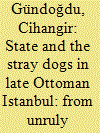| Srl | Item |
| 1 |
ID:
146780


|
|
|
|
|
| Summary/Abstract |
This article explores the techniques and strategies used by Ottoman authorities to control the Bedouin with a specific focus on the province of Hijaz between 1840 and 1908. Using primary sources from the Ottoman and British archives, it argues that the Ottoman Empire developed a ‘politics of negotiation’ towards the tribes in its attempt to secure cities and major pilgrimage and trade routes against tribal attack. The principal agents of the empire who made this negotiated governance possible were the amir of Mecca and the governor of Hijaz. As a result of this policy, imperial authorities had to give significant concessions to the tribes, and they thus incorporated them into the province's imperial order. When the Ottoman economy went through a crisis, as in the 1900s, negotiated governance and order faced great problems.
|
|
|
|
|
|
|
|
|
|
|
|
|
|
|
|
| 2 |
ID:
159008


|
|
|
|
|
| Summary/Abstract |
The present article situates the systemic efforts to annihilate stray dogs within the wider picture of Ottoman modernizing reforms in the nineteenth century. The period under investigation witnessed an increasing desire on the part of the modern Ottoman state to control and reform disenfranchised human and animal groups, which were believed to jeopardize public order, security and hygiene. These groups – beggars, orphans and the unemployed – were identified as actors irreconcilable with the modern image that the reforming bureaucracy and modernizing elites sought to project. In the face of increasing challenges from European powers, they were the epitome of underdevelopment and backwardness. Ottoman elites and official authorities therefore proposed and implemented institutional measures in the form of forced labor, reformatories or deportation to reform the conditions of these groups, segregate them from the greater public and discipline them. In the modern period, along with the proposals that called for the removal of dogs, modernizing intellectuals and professionals proposed alternative plans to render non-human animals beneficial to human needs and the modern state's expectations.
|
|
|
|
|
|
|
|
|
|
|
|
|
|
|
|